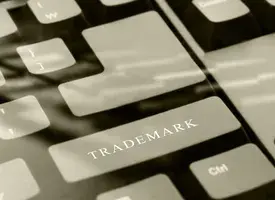IPCONNECT’s NEW YEAR SPECIAL
S.S. RANA & CO. TURNS 25 !!
The year 2014 has been a very special year for S. S. Rana & Co. as it turned 25 this year. The Founding Partners, Mr. Sohan Singh Rana, Mrs. Bindra Rana andManaging Partner Mr. Vikrant Rana alongwith Mrs. Lucy Rana and the member of the Firm came together to celebrate its silver jubilee on September 1, 2014.

On behalf of the entire team of S.S Rana & Co., we would like to take this opportunity to thank all our clients, our supporters and all our members, without whom we could not have made it this far. We are grateful for your loyalty to us. As our Firm policy stands today, so do we, strong and growing at 25 !!

Now let’s move on to see what went on for the rest of India did this year…
We have come far from where we started the year, From AAP sweeping itself out to NaMo’s swearing in as the PM of India. From being declared Polio-free to recognizing the ‘third gender’. From the Telengana split to the disaster in Kashmir. From ‘Jan Dhan’ to ‘Swachh Bharat’. From the Noble Peace Prize to fifth place at Glasgow. From the Earth’s orbit to that of Mars.
India in 2014 certainly saw the Modi wave with his popular campaigns of Jan Dhan Yojna creating 10 crore accounts and the effective implementation of Swachh Bharat Abhiyan which saw even celebrities taking the pledge to sweep roads.
It has most definitely been an eventful year.
Even on the IP front we have seen some interesting developments with the most exciting one being the DIPP ‘Think Tank’ set-up to formulate the New IP Policy following PM Modi’s trip to the United States of America.
COPYRIGHT
The year 2014 was another big year for Copyright developments in India, right behind 2012, which saw the much anticipated Amendment to the Copyright Act, and 2013, which gave us the new and improved Copyright Rules, 2013. Here are some of the highlights of the developments in the Indian Copyright world this year –
Copyright Office Launches New Logo and Web-Portal
The Indian Copyright Office launched its web portal as well as its new logo in an event organized by the Ministry of Human Resource Development on February 17, 2014. The new logo for the Copyright Office, comprises the insignia for registered copyright © cupped in a hand in tri-colour with the emblem of India next to it. The logo was designed by the National Institute of Design, Ahmedabad, and it was unveiled by the Hon’ble Minister of Human Resource Development, Dr. M.M. Pallam Raju as the Chief Guest.
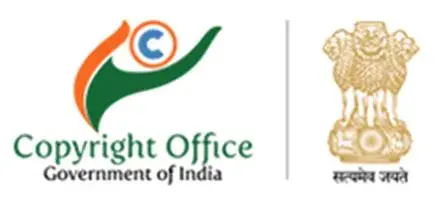
Adding to the many firsts, the first five electronically generated copyright registration certificates were presented to their respective applicants/ authors by Dr. Pallam Raju. This paved the path for remarkable progress as approximately forty thousand copyright applications were cleared in ten months with the pendency in the Copyright Office being brought down almost to a zero, as claimed by then Registrar of Copyrights, Shri. G.R. Raghavender.
The launch of the Copyright web portal, www.copyright.gov.in, facilitated the e-filing of Copyright applications via payment gateway and also provided for an ascertainment of current status of a copyright application vide its Diary No. The website also provides a check list of all documents and information essential to complete an application before filing and draws a detailed flow chart depicting the entire procedure right from filing of an application on Form XIV and until its registration.
Copyright Applications to Be Filed Online Only
In a move to promote online filing of applications, soon after the launch of the Copyright web portal in February, the Copyright Office of India, mandated the e-filing of copyright applications and closed down all physical filing counters with effect from August 01, 2014. The step was taken to augment online filings, thereby saving time, money and excessive paperwork involved in filing of copyright applications at the counter and expediting the grant of registration.
World Intellectual Property Day celebrates 100 years of cinema!
This year, the World IP Day on April 26, 2014 was celebrated with the theme “Movies – a Global Passion” to pay homage to the completion of 100 years of Cinema. Acknowledging the fact that movies are an indispensible facet of global entertainment industry, WIPO released its official statement notifying the theme, an excerpt from which is given below –
“… movies are a global passion – for the millions who watch them every day and for the hundreds of thousands who work in the global film industry. The writers and actors, directors and producers, the editors, composers and designers, the sound and light technicians, the creators of special effects and new technologies: each one contributing their spark of creativity and innovative genius to this most collaborative of works…”
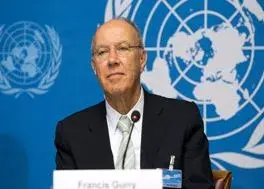
“Numerous players contribute to creating a film, and to enabling us to watch it as a seamless performance, woven from a multiplicity of intellectual property. Think about how a film is made. You start with a script, which is the intellectual property of an author or screenwriter. Then there are the actors, whose performances are their intellectual property. Then there is music, in which the composers and the performers have IP. Numerous players contribute to creating a film, and to enabling us to watch it as a seamless performance, woven from a multiplicity of intellectual property. IP underlies the whole film industry.”
– Message from the WIPO Director General Francis Gurry
WIPO Director General Francis Gurry, while reflecting on the prominent role played by the movie industry and its interplay with the intellectual property, acknowledged Bollywood in India, Nollywood in Nigeria, Scandinavian, and the North African and Chinese as flourishing movie industries worldwide alongwith Hollywood as the dominant player. He also acknowledged that movies, which are a direct product of intellectual property (IP), have witnessed the growth not only of global audiences, but also of global production and thus really are a global passion.
India Signs Marrakesh Treaty
April 30, 2014 marked another landmark in Indian Copyright Law as India alongwith the European Union, Greece and France signed the Marrakesh Treaty, which facilitates access to published works for the blind, visually impaired and print disabled persons. India became the first country to ratify the Marrakesh Treaty on June 24, 2014. Shri. Dilip Sinha, the Permanent Representative of India to the United Nations, handed over the instrument of ratification to Mr. Francis Gurry, Director General of WIPO during the 28th session of Standard Committee of Copyrights and Related rights (SCCR).
As per the World Health Organization, there are more than 314 million blind and visually impaired persons in the world, 90 percent of whom live in the developing countries, and India alone makes up for nearly 47 million of the global visually impaired population.
The Indian Copyright Act under Section 57(1)(zb), vide its amendment in 2012, now permits the conversion of work into accessible format for the benefit of the disabled. The purpose of the Treaty is to create a set of mandatory limitations and exceptions for the benefit of the visually impaired and print disabled. The Treaty also provides assurances to authors and publishers around the globe against any misuse or distribution to anybody other than the intended beneficiaries.
The treaty will facilitate access to the copies of the formats only to Authorized Indian Entities such as educational institutions, libraries and other institutions working for the benefit of the visually impaired.
PM For 15 Minutes On Twitter
A flashback to the year gone by in the Copyright world would be incomplete without mention of the 15-Minute-Twitter-PM fiasco.
On May 20, 2014 while the rest of India was hooked onto the much anticipated national election results with bated breath, a 19-year-old boy from Lucknow named Qaiser Ali, under the impression that pursuant to the election results the Prime Minister’s Office would have reset its official Twitter handle @PMOIndia and that the now old handle would be available, took on it and for 15 minutes held the most prestigious virtual post in India.
The Prime Minister’s Communication Advisor, Mr. Pankaj Pachauri had after general election results on May 16, 2014 changed the official PMO handle, @PMOIndia, without intimating the social media network Twitter due to which the official handle was unintentionally made open to all. The incident ended up inviting abundant media attraction and allegations worldwide wherein the predecessor party and its officials were condemned of acting unilaterally without informing Twitter India.
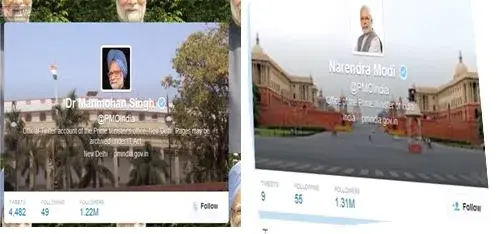
Interestingly, apart from creating political issues, the whole dealing also raised questions regarding Digital Inheritance which involves the process of handing over Digital Assets. The legal perspective of the whole issue indicates the violation of copyright and privacy laws. The Bhartiya Janta Party and its officials termed the whole act as unethical and illegal and claimed that the @PMOIndia handle is a “national digital asset” and could not be treated as a personal one by the Indian National Congress.
This entire issue of transfer of national digital asset brought to the fore a less exploited area of law involving digital assets. The creation and protection of digital assets considering the substantial involvement of social media in day-to-day dealings is an essential one thus, and the same needs to be protected by robust laws and industry standards.
TRADEMARKS
The dispute over the term ‘TODAY’ – Submissions During Prosecution of a Trademark Proved to be Tricky
In the case of Living Media India Ltd. & Anr v. Alpha Dealcom Pvt. Ltd. & Ors, the Delhi High Court (February 19, 2014) held that an entity cannot monopolise use of a word for a business of which the said word is so descriptive. The word TODAY is descriptive of the business of news and current affairs and therefore cannot be monopolised by any one entity.

The Plaintiff was the owner and publisher of the immensely popular weekly news magazine “INDIA TODAY”. The Plaintiff contended that they were the owner of several trademarks including ‘Design Today’, ‘Business Today’, ‘India Today Travel Plus’, “Spice Today”, “Money Today”, ‘Metro Today’, ‘Music Today’, TV Today Network’, ‘Mail Today’, ‘Headlines Today‘ etc. and is even the registered proprietor of the trade mark “TODAY”.
The Defendants had applied for registration of the trade mark ‘NATION TODAY‘ in respect of broadcasting and telecommunication services since June, 2010.
The Plaintiff therefore filed a suit for infringement of their trade marks and passing off action, and for restraining the Defendants from launching news channel named NATION TODAY.
The Defendants’ main contentions were as follows –
- Plaintiff’s submission to disclaim INDIA and TODAY during prosecution of the trademark:
During prosecution of the mark INDIA TODAY, the Plaintiffs had made voluntary submission before the Deputy Registrar stating that they may be granted Part B registration with a disclaimer on “INDIA” and “TODAY” separately (vide hearing dated 8.10.1987). This was due to the generic and descriptive nature of the words INDIA and TODAY. The final registration for the mark only disclaimed INDIA.
- Submissions in the Examination Reports: While replying to the Examination Report issued by the Trademark Registry in respect of their mark ‘INDIA TODAY’, the Plaintiff had stated against the cited conflicting mark ‘PUNJAB TODAY’ for TV news channel (wherein the applicant had claimed use since much earlier) that it was visually, structurally and phonetically dissimilar to their mark ‘INDIA TODAY’, therefore making an admission that mere use of the word ‘TODAY’ does not make the competing mark similar to their mark. Therefore, the Plaintiff cannot now allege similarity between their mark and that of the Defendant’s proposed to be used.
- Numerous third parties using TODAY in respect of daily publications/ news channels: Apart from the Defendants, numerous third parties have also adopted and are using the trade mark TODAY/TODAY-formative marks in relation to different goods and services including news broadcasting. Further, there are numerous companies for which TODAY forms a conspicuous and integral part of their trade name. The word ‘TODAY’ is extensively used in India and across the globe in respect of daily publications/ news channels. Therefore, the Defendants’ adoption of the mark NATION TODAY is bona fide.
- Cannot claim monopoly over the descriptive word TODAY: The word ‘TODAY’ is not an invented word but a common English word. The word ‘TODAY’ is clearly descriptive of the business of news and current affairs, is generic and the Plaintiff cannot claim exclusivity over the same.
Upholding the Defendant’s submissions, the High Court dismissed the Plaintiff’s application but with the observation that it was being dismissed only on a prima facie view of the matter and nothing observed to be considered as a final expression of opinion on the merits of both parties’ pleas.
Slogans/Taglines Serve the Purpose of Trademark
The Delhi High Court in the case Procter & Gamble Manufacturing Co. Ltd. v. Anchor Health & Beauty Care Pvt. Ltd. (May 30, 2014) discussed descriptiveness of a trademark. The plaintiff (Anchor Health) had a registered trademark ‘ALLROUND’ and they stated that the defendant’s use of the mark ‘ALL-AROUND PROTECTION’ vis-a-vis their toothpaste brand ORAL-B constituted an infringement of the plaintiff’s trademark.

Whether the mark ALLROUND is descriptive of Toothpaste?
The defendant contended that the plaintiff’s mark was descriptive/generic and therefore, did not satisfy the basic function of trademarks, namely, distinguishing the goods of one from those of the other. The defendant also argued that they were using “ALL-AROUND PROTECTION” to indicate the kind and quality of their goods and hence, this use did not constitute an infringement of trademark.
The court on this issue applied the legal principle of approbate and reprogate and held that defendant therefore cannot claim that the plaintiff’s mark “ALLROUND” is descriptive. In the present case, the defendant themselves had applied for registration for trademark protection of “ALLROUNDER” and “ALL-AROUND PROTECTION” in USA, thus they cannot claim that the plaintiff’s mark “ALLROUND” did not deserve trademark protection. Further, the court held that the tagline ALLROUND PROTECTION is not generally descriptive of toothpaste and further explained that taglines/slogans are valid trademarks as they serve the purpose of trademark by enabling consumers to identify the goods and services provided by one from those provided by another.
Whether the defendant’s mark infringed upon the plaintiff’s mark?
On this issue,the Court restated the test for infringement. The test is that in order to determine whether one mark is deceptively similar to another, it is necessary that the broad and essential features of the two marks are considered to determine whether there is an overall similarity between the two marks. The Court has to judge the overall impression made by the marks in the minds of the general public and not merely consider the dissimilarities between the marks. Applying this test, the Court held that the defendant’s marks “ALLROUNDER” and “ALL-AROUND PROTECTION” infringed upon the plaintiff’s mark “ALLROUND”. The Court stated that the essential feature of both the plaintiff’s and the defendant’s mark is “ALLROUND”. The Court further stated that the many similarities between the two marks were likely to deceive and confuse a customer.
Therefore, the Court granted the interim injunction in favour of the plaintiff restraining the defendants from using the impugned trademarks or any trademark deceptively similar to the plaintiff’s mark till the disposal of the suit.
Amended Rules For Cigarette Packaging In India
On October 15, 2014 the Ministry of Health and Family Welfare issued a notification amending the ‘Cigarettes and Other Tobacco Products (Packaging and Labelling) Rules, 2008’.
The amendment means that 85% of the Pack of any tobacco product would be covered with a health warning message (60% pictorial and 25% textual). The size and languages of such health warning was also stipulated.
The Allahabad High Court in July, 2014 urged the Government of India to consider the implementation of ‘Plain Packaging’ for cigarettes and other tobacco products. The Hon’ble Court was of the belief that the current packaging of cigarettes were too colourful and attractive. It stated that it is the attractive packaging that was drawing young people to smoke, and if it was mandated that cigarettes be sold in plain packaging, with minimal writing and no logos and colours that would surely dither the youths from smoking.

Source: independent.co.uk
The plain packaging debate is not one of India alone; many countries have considered plain packaging as a method to reduce the number of smokers in the world. However, the major industry stake holders oppose the Plain Packaging gambit with the contention that it is against their Right to advertise their trademarks on their product. Though their cry is one which is Pro-IP, but in this battle should IPR be held above the health and lives of billions of smokers in the world.
Nothing dirty about “The Dirty Picture”
The Dirty Picture, inspired by the life of Silk Smitha, starring Vidya Balan was a Box Office Hit in the year 2011, which not only bagged many awards but also gained popularity through the song “Oh La La”, which was literally blasting on the radio for quite some time. Seeing the movie’s commercial success, the leading production house of the film Balaji Motion Pictures Limited had applied for the trademark registration of the title “The Dirty Picture”, “Dirty Picture” and “thedirtypicture.com” in several classes that provided for cinematographic film, vinyl records, audio tapes etc.
On the other hand, the Kannada film makers Akshaya Productions intended to release a movie with the similar title – “Dirty Picture – Silk Sakath Hot Maga”, for which theProducers had even registered the title with the Karnataka Film Chamber of Commerce. Learning of this, Balaji Motion Pictures had filed a suit to restrain them from proceeding with the aforesaid title and preventing any copyright infringement as it had apprehensions that the story of the new film was also likely to infringe its copyrights in the literary work.

The Bombay High Court held in favor of the Plaintiff and directed the Defendants to name their movie “Silk Sakath Hot Maga” thereby restraining them from using the name “Dirty Picture”. The Karnataka Film Chamber of Commerce was also directed to cancel registration of the name “Dirty Picture Silk Sakath Hot Maga”. What makes the case interesting is perhaps the Court’s verdict that has recognized the brand name exclusively of a movie title.

Bollywood Personalities Protecting Their Personality Rights
Sonu Nigam filed a suit for obtaining injunction against use of his image in publicity hoardings by Mika Singh for Royal Stag Mirchi Music Awards which took place on February 7, 2013. He alleged that usage of his image in hoarding was unauthorized and infringement of his privacy and publicity rights as well as were defamatory in nature as they gave an unjustified and incorrect impression to the public about the prominence given to Mika when compared with other artists at the awards. The hoarding carried a large picture of Mika Singh along with smaller pictures of other artists namely Sonu Nigam, Shreya Ghoshal, Ayushman Khurrana and Himesh Reshammiya. The Hon’ble High Court of Bombay granted an injunction in favor of the Plaintiff restraining the Defendants from displaying and using Plaintiff’s Images and directed the Defendant to pay damages of INR 10 lakhs to Plaintiff which he donated to charity as specified by the Plaintiff.
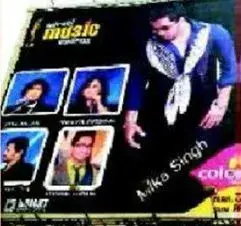
Living by the motto “impossible is nothing”, our beloved Rajnikant too moved to Court enforcing his Personality Rights and filed a suit in order to stop the release and screening of the unauthorized Hindi biopic, “Main Hoon Rajnikanth”, wherein he alleged that his persona has not only been used without permission but also portrays him in negative light therefore defaming and misleading his image amongst his humongous fan following. He has also alleged that the producer has taken advantage of his gravity defying stunts and charismatic expressions / dialogues which often attain cult status in the film.
The Hon’ble Madras High Court granted the order in our superstar’s favour restraining the release of the film and added that, “the person in the caricature is in the same style of popular actor Rajinikanth, and the wordings available therein would show that the person is a CBI officer, stupid, part-time social worker, part-time contract killer etc. and describing the person as a womanizer.”
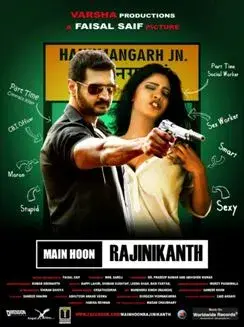
Actress Sridevi also sent a legal notice to the filmmaker Ram Gopal Verma alleging that he is using her name to promote his upcoming film Sridevi and that “RGV’s film would only tamper her reputation”. The first look of the yet to release movie’s poster depicted a young boy ogling at the midriff and navel of a woman which has already earned the wrath of State Commission of Protection of Child Rights, who filed a suo moto case on RGV for violation of child rights. Since the actress hasn’t given her consent to use her name as a film’s title, the lawyers, who have sent the legal notice to RGV on behalf of Sridevi, have also stated that it is gross violation of her privacy and would subject her to needless embarrassment as she does not have any control over the content of any unauthorized or unapproved film.

Disclaimer: Yeh “Nahi He” Pepsi Ka Youngistaan Meri Jaan
The movie Youngistaan, which recently made it to the Oscar’s Nomination List, starring Jackky Bhagnani, Neha Sharma and Boman Irani, was caught in the legal battle with the global soft drink major PepsiCo. Inc. who had moved to the Delhi High Court seeking for a permanent injunction and restraining the producers from launching their movie under the impugned title “Youngistaan” which had violated their registered trademark and campaign “Yeh He Youngistaan Meri Jaan” starring Ranbir Kapoor and Deepika Padukone and was claimed to be nothing but a blatant imitation of the Plaintiff’s registered campaign title which gained huge popularity. The film was also the film in which late Farooq Sheikh made his last appearance.
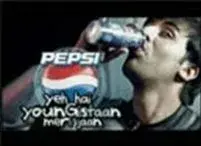
In its plea PepsiCo. alleged that they had not only issued a cease and desist notice to the producers of the film to refrain from advertising, promoting and releasing of the film but also claimed that the producers deliberately escalated the promotion and advertisement of the film and ignored the plea by PepsiCo.
However, the trademark infringement matter dissolved with both the parties agreeing to a settlement, with the film makers having to add a disclaimer which was read as: “This movie is not related to or associated with, sponsored or promoted in any manner by Pepsi or Pepsi’s Youngistaan Campaign”. Through the order of the Court, This disclaimer was only displayed at the beginning of the movie, but also in non-theatrical trailers, the official website of the film, the official twitter account, official facebook account and the official YouTube page. The movie finally released on March 28, 2014.
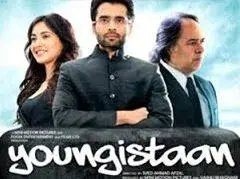
PATENTS
Non-Compliance with Section 8 of Indian Patents Act “may” not revoke the Patent in India
The Delhi High Court has (Please put the date here) November 07, 2014 ruled that patentee’s non-compliance with section 8 of the Indian Patents Act will not automatically revoke the patent u/s 64(1) (m). The decision was taken by the Court in the case of Sukesh Behl v/s Koninklijke Phillips Electronics.
Section 8 provides that an applicant is required to file a statement furnishing details of any patent application being prosecuted by him in a foreign country and Section 64 of the Act provides for revocation of patents in case the applicant has failed to disclose to the Controller the information required by section 8 or has furnished information which in any material particular was false to his knowledge.
In the instant case, the plaintiff/ respondent sought permanent injunction for restraining the defendants from infringing its essential DVD Video/DVD ROM Disc Patents, in particular Indian Patent with registration No.218255 (Method of converting information words to a modulated signal). In reply, the defendants claimed for revocation of the suit patent under Section 64(1)(m) of the Patents Act, 1970 for non-compliance of the provisions of Section 8.
The learned Single Judge was of the view that whether there was an admission as to willful suppression of the information as required by Section 8(1) of the Patents Act and whether the information that was withheld was material to the grant of the suit patent is a matter for evidence and therefore the prayer to pass a judgment revoking the suit patent under Order XII Rule 6 of CPC is not possible. Aggrieved by the aforesaid, the defendants appealed in the Higher Court. The Division Bench ruled in favour of the plaintiff/ respondent and after examining the affidavit filed by the plaintiff, the Court held that there was no failure on part of the plaintiff to comply with Section 8(1) (b). The Court further observed that the information provided was incomplete, and whether this omission was a mistake or intentional would have to be decided in trial, based on evidence.
Delhi High Court: Micromax To Pay Royalty To Ericsson
Micromax has been directed by the Delhi High Court in its order dated November 12, 2014 to pay a staggered royalty from 0.8-1.3% upto 2020 to Ericsson for using their Standard Essential Patents (SEP) in its mobile phones.
The Court has also set the deadline to December 31, 2015 to conclude the trial and until then the interim injunction would continue.
Brief Background upto the Present Dispute
- The present dispute is between Micromax Informatics Limited, Indian mobile handset manufacturer and Ericsson group, one of the world’s largest telecommunication companies and the largest holder of “Standard Essential Patents” for mobile communication.
- On November 03, 2009, Micromax, received a notice from Ericsson that Micromax has infringed its essential GSM patents and demanded that they should secure the licences of those patents on Fair, Reasonable and Non Discriminatory Terms (FRAND Terms). However no details of the patents so infringed were provided.
- Ericsson sent a similar notice again on June 29, 2011, repeating its demand. Micromax made a request for details of the FRAND licences but the same were not provided.
- However, thereafter Micromax, at the instance of Ericsson, entered into a Non-Disclosure Agreement on January 16, 2012. The terms of the FRAND licences were disclosed on November 05, 2012 and it was demanded that Micromax should accept licences on FRAND terms within 25 days otherwise it will be construed as refusal to sign FRAND licence agreement.
- The negotiations between Micromax and Ericsson failed because Micromax wanted to link the payment to the value of the chipset while Ericsson wanted it to be a share of the hand-set value as is the case globally.
- Thereafter Ericsson instituted a civil suit against Micromax, [C.S. 442/2013], before High Court of Delhi, alleging infringement of eight Standard Essential Patents (SEPs), used in 2G, 3G and 4G devices.
Delhi High Court’s Interim Arrangement
- The Single Bench of the High Court passed an interim ex-parte order in favour of Ericsson. The Court also directed the Custom Authorities that as and when a consignment was imported by Micromax, Ericsson should be intimated, and objections of Ericsson be decided under Intellectual Property Rights (Imported Goods) Enforcement Rules, 2007.
- Micromax filed an appeal against the order, the Division Bench clarified that the directions of the Single Judge would not be read as an opinion prima facie in favour of either party.
- The Single Judge recorded an interim arrangement (which was to continue until disposal of application for interim injunction) between the parties, as per which Micromax had to pay royalties to Ericsson at the rates demanded. (Royalty of INR 29.45 crores was deposited).
Micromax-Ericson in the Competition Commission Of India
- In the meantime, Micromax filed a complaint (Case No. 50/2013) in Competition Commission of India (CCI) against Ericsson alleging that Ericsson demanded unfair, discriminatory and exorbitant royalty for its patents regarding GSM technology.
- CCI found prima facie evidence of Ericsson indulging in discriminatory trade practices. It mentioned that Ericsson was acting contrary to the FRAND (Fair, Reasonable and Non-Discriminatory) terms by charging patent royalties based on the cost of the user product (mobile phone, tablets and others) rather than the product being licensed (chipset), which is discriminatory on November 12, 2013.
- Delhi High Court on January 21, 2014 restrained the Competition Commission of India (CCI) from passing any final orders on a probe that CCI had initiated in the matter.
Delhi High Court – Staggered Rates of Royalty Upto 2020
- Ericsson argued in the Court that it has similar payment arrangements (at least 26 licence agreements) with many handset makers globally.
- The Court, after perusing the royalty rates contained in those agreements, arrived on staggered royalty from 0.8-1.3% upto 2020,which Micromax has to pay to Ericsson for using their Standard Essential Patents (SEP) in its mobile phones.
- Micromax also cleared that it has plans to expand to other markets overseas and would negotiate the royalty rates separately with Ericsson under global guidelines.
BAN-BAN !!
Delhi High Court Ban on Xiaomi and partial lift thereafter
The Delhi High Court on December 08, 2014 passed an interim injunction against Xiaomi and its local e-commerce partner Flipkart until February 05, 2015 in response to the suit filed by Ericsson accusing Xiaomi of infringing its Standard Essential Patents (SEP) pertaining to AMR, EDGE and 3G technologies.
The Chinese smartphone maker Xiaomi has entered into exclusive agreement with Flipkart that sells and markets its allegedly infringing devices/handsets in India. It has sold more than 80,000 smartphones since its launch in July in India and has occupied more than 1% share of India’s smartphone market.
| Ericsson’s SEP Patents infringed by Xiaomi | ||
| AMR Technology | 3G Technology | Edge Technology |
| IN203034 | IN229632 | IN241747 |
| IN203036 | IN240471 | – |
| IN234157 | – | – |
| IN203686 | – | – |
| IN213723 | – | – |

Ericsson alleged that it had already proposed to Xiaomi to obtain license from them to use the patents, but Xiaomi did not accept it instead entered the Indian market and opened an Indian subsidiary Xiaomi Technology India Pvt. Ltd.
The details of SEPs which are allegedly infringed are as below:
The Court has directed the following till the next date of hearing:
(i) The Defendants (Xiaomi, its Indian subsidiary and Flipkart) are restricted from manufacturing, assembling, importing, selling, offering for sale or advertising through their and third party, websites, products (telephone instruments, mobile handsets, tablets, hand-held devices, dongles, etc.) and any future or other devices or models that include the AMR, 3G and EDGE technology/devices/apparatus as patented by Ericsson.
(ii) The Central Board of Excise and Customs is directed to prohibit any import of Xiaomi’s infringing mobiles, handsets, devices, tablets, etc. and customs authorities are to intimate Ericsson about any such consignments.
(iii) The Defendants are required to file an Affidavit disclosing the:
- Quantum of devices (handsets, tablets, etc.) sold by it in India till date that are infringing in nature; and
- Revenue earned till date from the sale of mobile devices (handsets, tablets, etc.)
Ban on Xiaomi Partially Lifted
As per the news reports (link below), Xiaomi has been granted a temporary relief by the Delhi High Court, allowing it to sell devices that use chip sets imported from Qualcomm Inc., a licensee of Ericsson. A bench headed by Justice Pradeep Nandrajog passed a “pro tem order” allowing Xioami to continue sales and import its Qualcomm chipset based Smartphones.
Xiaomi contended that it has not infringed Ericsson’s patents as Qualcomm has obtained a license from the Swedish Company for its technology. The Bench of the Hon’ble Delhi High Court disposed the said appeal which challenged the Single Judge order dated December 8, 2014, and issued a “pro tem order” in favor of Xiaomi, however the order also directed Xiaomi to deposit INR 100 on every handset sold as royalty in favor of the Registrar General of the Delhi High Court. A ‘pro tempore’ or ‘pro tem’ is a temporary/provisional order passed by a court.
Xiaomi has also been asked to furnish an affidavit disclosing the number of handsets sold and the number of Qualcomm chipsets purchased, before the next date of hearing before the Single Judge, i.e., February 5, 2015.
GEOGRAPHICAL INDICATIONS
As of December 15, 2014 the G.I. Registry had received over 500 applications, of which 215 have been granted. That means that 215 products from India enjoy the tag of GI and no other producers, even from other parts of the country let alone the world can stake a claim on these products.
The Registry states that the delay in progress of the remaining 265 applications is caused mainly due to non-compliance of the legal requirements by the applicants. If the pendency could be completed then that many more products would have the protection that certifies their characteristics as being attributable to the geographical area where they are produced.
Some of the most famous G.I.’s in the world are none other than Champagne and Scotch Whisky and then there are our very own G.I.’s like Kolhapuri Chappals and Kanjeevaram Sarees.
India as a country has been trying to increase the awareness about Geographical Indications and how they will help the small & medium industries and the artisans/craftsmen of India.
Being a country of vast topographic diversity, it is no surprise that India has ‘specialities’ coming from every district of every state. With nearly 700 districts in 29 states and 7 union territories, that is a lot of ‘specialities’.
The Case of the missing GI
The Basmati Rice case has been an ongoing struggle for over a decade, in 1997 there was Texas based company and then the Philippines tried to start its own version of the fragranced long grain rice, with the Indian GI office having directed the agri-export body to file an amended application in January this year, including Madhya Pradesh as a Basmati Growing region.
It seems like Basmati Rice will have to wait in line for some more time before its certification is finally found.
The conundrum with Basmati is that the rice is grown in the foothills of the Himalayan Range, and being as it is parts of Pakistan are also perfect regions for growing Basmati. It is a recognised fact that any international application for the certification of Basmati would have to be made jointly by India and Pakistan.
We wait for the day that Basmati will have its day of glory with its GI tag, as of today we must find ways to fend off the “Texmatis” of the world.
Darjeeling Sales Face Hit After EU Grants It Protected Status

India’s first and probably most famous G. I., Darjeeling Tea is facing some trouble in one its biggest markets, Europe.
In 2011 the European Commission came out with the ‘Protected Geographical Indication’ status and the same was granted to Darjeeling Tea.
This means that starting next year EU must sell only 100% Pure Darjeeling Tea. A Geographical Indications allows for a product to be certified as coming from a specific geographical area and having a specific standard and quality. The protection of Darjeeling in EU should mean that the planters back in India have a right to stop all other tea producers from selling under the name of Darjeeling.
However, it seems to have had a negative effect on the sales of the tea for this year. The EU blenders are expected to offload their stocks this year and start buying fresh stocks so that they can sell pure Darjeeling from next year.
This doesn’t seem to have happened. It is also believed that the Nepalese Himalayan Tea, which is cheaper than Darjeeling is making its way to Germany and Europe. This mandate to sell pure Darjeeling may be good from an IPR perspective but it is hampering the sales of the tea.
Generally, Europe buys nearly 3-4 million kgs of the total production of 8-9 million kgs of the tea, with the price range being between Rs. 800-2000 per kg.
Nagoya Protocol
On October 12, 2104 the Nagoya Protocol on Access to Genetic Resources and the Fair and Equitable Sharing of Benefits Arising from their Utilization under the Convention on Biological Diversity came into force, after receiving the requisite ratifications by 50 nations.
The Protocol which is intended to bring a greater legal certainty and transparency in the equitable sharing of benefits arising out of use of bio-diversity and traditional knowledge, for both the users and the providers of such resources and the associated knowledge.
India is expected to benefit from the same being a nation with vast diversity and a large database of Traditional Knowledge. The protocol, as of December 23, 2014, as per the official website of the Convention on Biological Diversity, has 92 signatories out of which 53 are parties
UPDATES FROM THE INDIAN INTELLECTUAL PROPERTY OFFICE

- February 28, 2014: The CGPDTM published “Draft Guidelines For Examination Of Patent Applications In The Field Of Pharmaceuticals.”
- March 04, 2014: The Government of India notified the draft Designs (Amendment) Rules 2013.
- March 07, 2014: Facility for Online filing of various entries contained in Schedule 1 of the Patents (Amendment) Rules 2014 has been introduced in existing e-filing services for Patents.
- March 17, 2014: The Indian Patent Office issued draft guidelines for applications relating to the Pharmaceutical patent applications establishing uniform and consistent practices in the examination of patent applications.
- May 20, 2014: CGPDTM launched a Stock and Flow based Dynamic Trademark Utility which provides the applicants/stakeholders with the facility to view the Trade Marks under different stocks and the flow of TM applications among the various stocks.
- July 02, 2014: CGPDTM published a public notice regarding deposition of biological material to an International Depository Authority under the Budapest Treaty.
- July 07, 2014: CGPDTM launched a Pilot Project to Develop and Test a System of Transfer of Patent Applications files among different IPO Locations.
- August 07, 2014: IPO published a Public Notice regarding Increase in the Trade Mark Application fees.
- September 30, 2014: CGPDTM released the new version of electronic Patent register in the IPAIRS. The new version now includes the legal status of Patents along with other details like Due Dates, Information u/s 146 (Working of Patents), Linked Applications (Parent or Divisional) etc.
- October 29, 2014: CGPDTM launched “Guidelines for examination of patent applications in the field of Pharmaceuticals after extensive consultation with stakeholders.
Further information regarding any new developments in the IPO can be accessed here
This year truly has been eventful, and it doesn’t end there.
With a Noble Peace Prize being shared by an Indian, Kailash Satyarthi and a Pakistani, Malala Yousafzai the irony which was the only thing missing has also been covered.
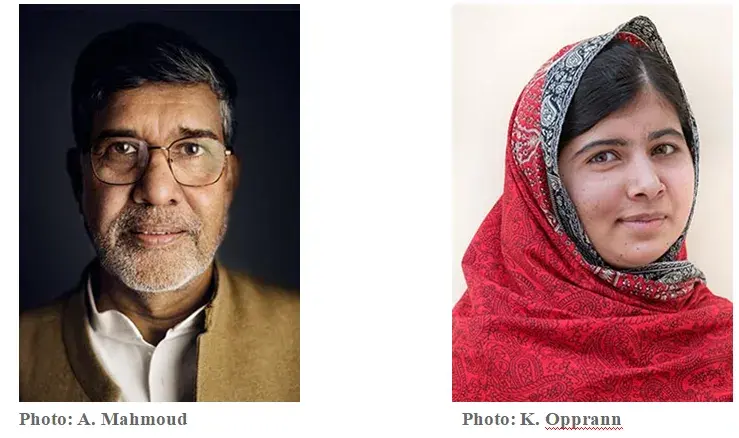
Justice H. L. Dattu was appointed as the new Chief Justice of India, after having served as Chief Justice of the Chhattisgarh High Court and the Kerala High Court. He was sworn in as the 42nd Chief Justice of India on September 28, 2014 on the recommendation of Chief Justice of India, R. M. Lodha. Justice H. L. Dattu will have tenure of little over a year, with his retirement on December 2, 2015.
Our very own Nirmala Sitharaman, Minister of Commerce and Industry was named amongst the Most Influential Policy Makers in the World. Her bold statement was also covered in the Managing IP article that showcased the 50 Most Influential Policy Makers in IP 2014, “we are clear on our IPR and where we need to protect our IPR, we will stand up and speak without hesitation. There is no grey area here and if there are grey areas for the US authorities, we are wiling to openly speak about them”.
We are proud of our Policy Makers and in the light of this clarity we look forward to the
New IP Policy of India being formed by the DIPP Think Tank.
India along with 10 other countries of the South-East Asia Region have been declared and certified as Polio-Free this year.
So Good-Bye Polio!
S. S. RANA & Co. AND 2014
S.S. Rana & Co. has proactively been involved in not only disseminating and spreading awareness amongst students in regard to the ever promising field of Intellectual Property, but has also been actively engaged with various academics, professionals and institutions to impart and share the vast knowledge of IPR and how to protect the same, for which our team has not only travelled inter-state but cross-countries as well.
S. S. RANA & Co.’s CONTRIBUTION IN IPR SENSITIZATION
Some of the contributions made by the firm in 2014 are delineated below:-
- Mr. Vikrant Rana, Managing Partner of S.S. Rana & Co., participated as a Speaker at the International Federation of Intellectual Property Attorney’s (FICPI) 15th Open Forum which took place from November 5-8, 2014 at Barcelona, Spain. The working programme of the 15th Open Forum featured FICPI’s unique and highly regarded multi-stream working sessions with three parallel streams- patents, trademarks and the practice of IP as a business. The programme structure constituted of sessions featuring high – profile speakers who dealt with latest developments in IP in Europe, America and Asia. Mr. Rana shared his views on Foreign Words as Trade Marks.
- Mr. Vikrant Rana participated as a Speaker in the Round Table Discussion organized by The Society of Intellectual Property Attorneys (FICPI India) in New Delhi on November 28, 2014 where he presented India’s position on Protection of Trademarks: Colour- It’s Not Black and White. The presentation highlighted various aspects relating to protection of colour trademarks in India including whether a trademark filed in black and white is equivalent to trademark in all colours, limitations as to colour, protection of single colour marks and combination of colour marks especially in light of the European Union’s new practice for black and white and colour trademarks.
Mr. Vikrant Rana participated in the Session organized by the Confederation of India Industries (CII) on October 29-30, 2014 in Delhi wherein training was imparted to Customs Officials on the best practises to be followed while enforcing IPR in India. Mr. Rana shared his views with the Customs Officials on the various legal and procedural aspects of trademark and design applications and their enforcement in India.
- Mrs. Lucy Rana, Managing Associate Advocate of S.S. Rana & Co., participated as a guest speaker at the two day IP Awareness Program held in New Delhi on November 1-2, 2014 at the FICCI Federation House and Delhi University Conference Centre. This event was organized by FICCI in association with the Indian Patent Office (IPO) and Delhi University where Mrs. Rana deliberated on the topic of Intellectual Property – Concept, Identification and Creation and shared her views on basic concepts and knowledge of Intellectual Property in the fields of Patent, Trademark, along with advantages of IP, Importance of IP, and IP as a tool to increase business competitiveness.
- Mr. Rupin Chopra shared his views on DRM (Digital Rights Management) and Combating Book Piracy in the Digital Age at a two day conference held in Dhaka, Bangladesh on August 27-28, 2014 on Challenges and Opportunities in Book Publishing. The discussions pertained to Digital Millennium Copyright Law, USA and eligibility criteria for both India and Bangladesh under WIPO Copyright Treaty and WIPO Performances and Phonograms Treaty for incorporating the provisions of civil and criminal remedies for circumvention of technological measures used by the copyright holder to prevent unauthorized redistribution of digital content in the respective law.
- Ms. Ritika Mogha, conducted a Workshop on the IP Tool Kit prepared by S.S. Rana & Co. in collaboration with FICCI on December 11, 2014 in Ahmedabad, discussing the specifics of the IP Tool Kit, highlighting the specific challenges faced by Indian Customs in respect of counterfeiting and piracy, the relevant provisions of law, landmark Judgments and methodologies developed to identify counterfeit products and handling copyright infringement issues.
- Ms. Ritika Mogha also participated in the conference Publicon, 2014 organized by FICCI on December 03, 2014 as a speaker and presented her views on Protection of Copyright in the Digital Age which enumerated the copyright issues in the digital age, laws relating to Digital Rights Management (DRM) in India, the Copyright Amendment Act, 2012 and the best practices followed worldwide for protection and enforcement of copyright in the digital age.
S. S. RANA & CO.’s CORPORATE SOCIAL RESPONSIBILITY ACTIVITIES
- Financial Assistance to Students
Our Firm in alliance with VIDYA DARSHAN RANA (VDR) CHARITABLE TRUST supports Sri Aurobindo Ashram, New Delhi and contributes annually towards education and sponsorship for needy children. The Trust also supports three students studying in Victory Public School at Bakhlaur (Distt. S.B.S. Nagar) through the VDR Trust Fund.
- Distribution of warm clothes
As a part of its social responsibility, S. S. Rana & Co. in Alliance with VDR Trust extended support to the needy under its campaign – Sunny Winter Week (December 21, 2013 to December 30, 2013) by distributing woollens, blankets, sweaters, jackets, shawls etc. on January 10th, 2014. The Trust’s campaign was met with great enthusiasm by all the employees of S.S. Rana & Co. who had compassionately contributed towards donating and raising warm clothes, blankets, sweaters etc. for those in need. All the items donated by the employees were distributed to the street children, hawkers and to the unprivileged and homeless people.

- Cancer Walk-2014
Every year VIDYA DARSHAN RANA CHARITABLE TRUST and S.S. Rana & Co. extend their support to Cancer Patients by participating in the Cancer Walk – “Walk for Life” which is organized by Cansupport to raise awareness about this disease. This year on February 02, 2014, many employees of our firm took part in this Walkathon. The VDR Trust extends its solidarity with cancer patients and survivors and is committed to raise awareness, in every possible way about this deadly yet curable disease.
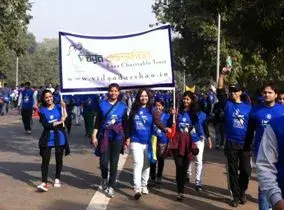
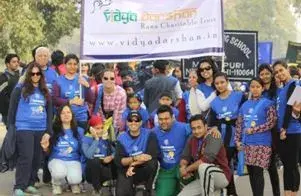
- All India Essay Writing Competition
In order to give young students an opportunity to understand the role played by Intellectual Property Rights and to raise awareness of IP Rights in India,every yearsince 2012the Trust in association with S.S. Rana & Co. has been organizing Script it!™ – All India Essay Writing Competition on the occasion of World Intellectual Property Day (April 26). ‘Script it!’ has been acknowledged by WIPO (World Intellectual Property Organization). This year the theme was based on “Movie a Global Passion”.
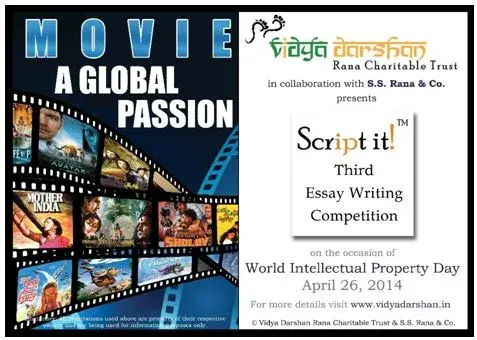
- World Environment Day
The Trust has always been committed to adopt policies that are environment friendly so as to protect and conserve our vulnerable natural resources. To raise awareness on implementing eco-friendly measures as well as to bring down wastage and minimize the risks of greenhouse effect and global warming, the Trust in association with our firm celebrated the World Environment Day by planting trees.
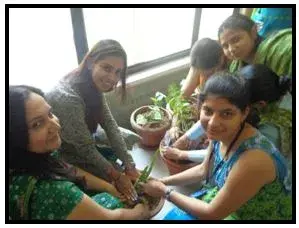
- All India Design Competition
In view of the World Industrial Design Day and to spread IPR awareness and acknowledge dissemination, the Firm in alliance with the Trust has been organizing Creatio™ – The All India Design Competition, since 2012. ‘Creatio’ is acknowledged by the International Council of Societies of Industrial Design (ICSID) which is a non-profit organization that protects and promotes the interests of the profession of industrial design. Founded in 1957, ICSID has a network of students and professionals, from over 50 nations devoted to the recognition, success and growth of the industrial design community. The competition was hotly contested with several students participating from across India. The winners of this competition received cash prize and certificates.
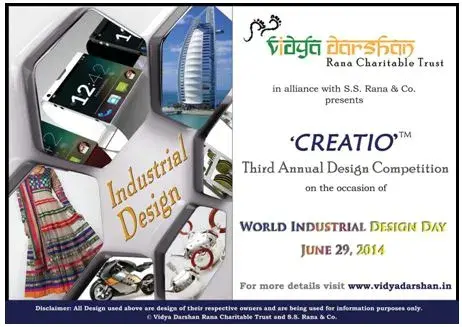
- CRPF Marathon – October 12, 2014
Our Firm participated in the CRPF Marathon held on October 12, 2014. It was organized by The Central Reserve Police Force, the world’s largest Police Force on its Diamond Jubilee year with the theme “RUN FOR LIFE” to promote nationalism. As a social responsibility, Our Firm’s Founding Partners and employees enthusiastically participated in the Marathon.
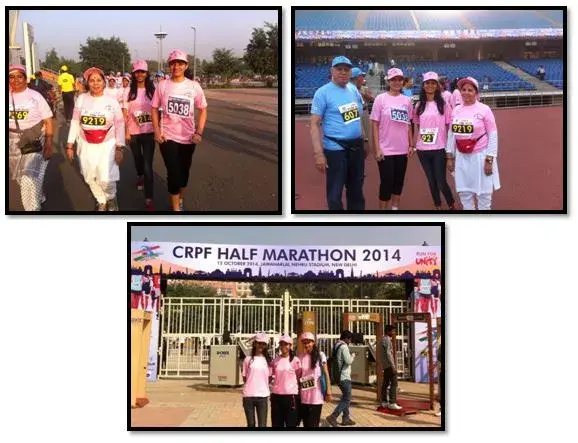
- Delhi Half Marathon November 23, 2014
Our Firm believes in team building exercises and organizes events to keep our members/employees active, healthy and also to meet our social obligations. Our Firm has participated in the Airtel Delhi Half Marathon for the last five years. The Partners as well as the employees of our Firm participated in the Marathon this year as well; donations raised from which help in improving the lives of thousands of individuals.
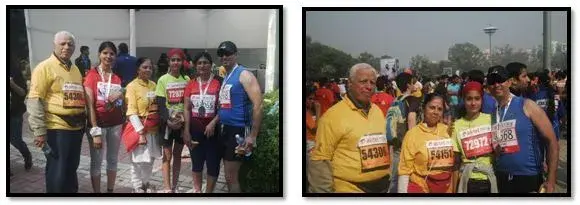
- Backing Our Employees To Be Part of The T-20 Asia Cup
One of our very own, Mr. Fahimuddin was selected to be a part of the T-20 Asia Cup Tournament Cricket Championship for deaf 2014. The employees of the Firm came together to contribute to make it possible for him to participate in the tournament. Efforts of all paid off as India not only won the first ever T-20 Asia Cup for Deaf’ 14 but also Mr. Fahumuddin was pronounced the ‘Man of the Match’. The firm believes in equal opportunity for all including physically challenged.

IP CONNECT Wishes Its Readers A Very Happy and Prosperous New Year 2015 !!
As far as the IP regime is concerned, the former part of year saw India listed in the Priority Watch List by the USTR (United States Trade Representative) in its Special 301 review, however Narendra Modi’s visit to U.S. in September this year assured strengthening of Intellectual Property protection and enforcement in India.
The Ministry of Commerce and Industry also constituted a Think Tank for drafting National IPR Policy. The first draft of the Policy has already been submitted to the Centre. Reportedly the draft suggests balancing of national priorities and international obligations, establishing a dynamic and vibrant IPR system and fostering innovation and creation. It has also been reported that the draft proposes opening of IP Promotion and Development Council which aims at opening IP Promotion and Development Units in all states that would organize start-ups and manufacturing units for IP awareness, protection and utilization.
The Indian Intellectual Property Office moved ahead towards digitization and initiated several efforts for making the IP system more transparent and less- time consuming in India. The Copyright filing counters were closed and only online filing of copyright applications was accepted. Moreover, the IP Office enabled comprehensive e-filing facility of more subsequent TM Forms and launched a Stock and Flow based Dynamic Trademark Utility which provides applicants/stakeholders with the facility to view the Trade Marks under different stocks and the flow of TM applications among the various stocks.
With the spurt being witnessed in online purchase of goods and services, E-commerce issues/ disputes have also augmented. Flipkart’s Big Billion Day sale sparked some controversies alongwith the fear of depleting traditional brick and mortar purchase in India. The Delhi High Court also ruled on the issue of jurisdiction in cases of E-commerce.
The end of year saw some important IP events like submission of draft National IPR Policy to the Centre, the DU Copyright case completing the stage of arguments and the release of IP Expressions by the IP Office – a technical magazine for awareness of IP and fostering of innovation.
With this note IP Connect wishes all its readers a very happy, bright, cheerful and prosperous New Year 2015 !!




